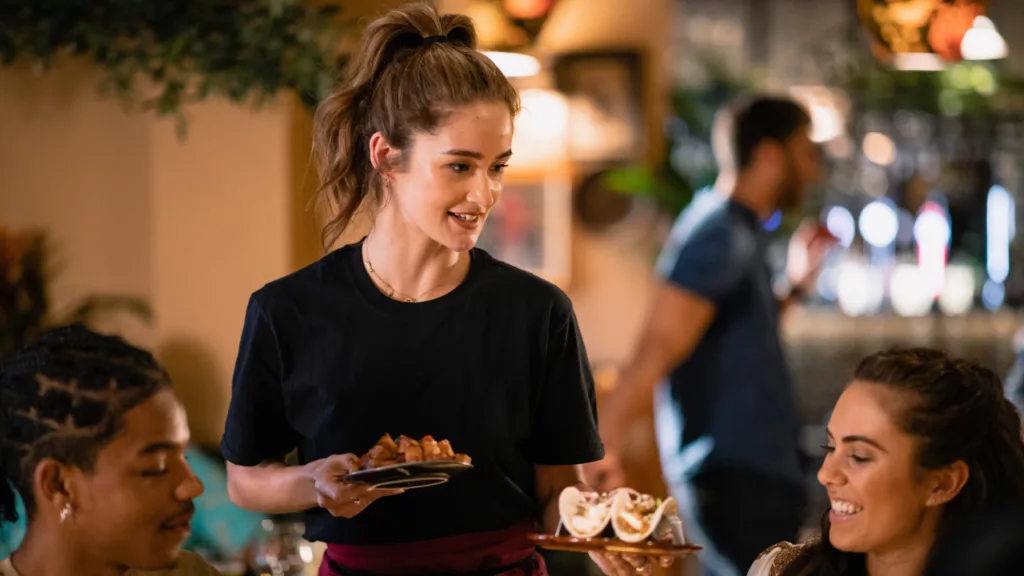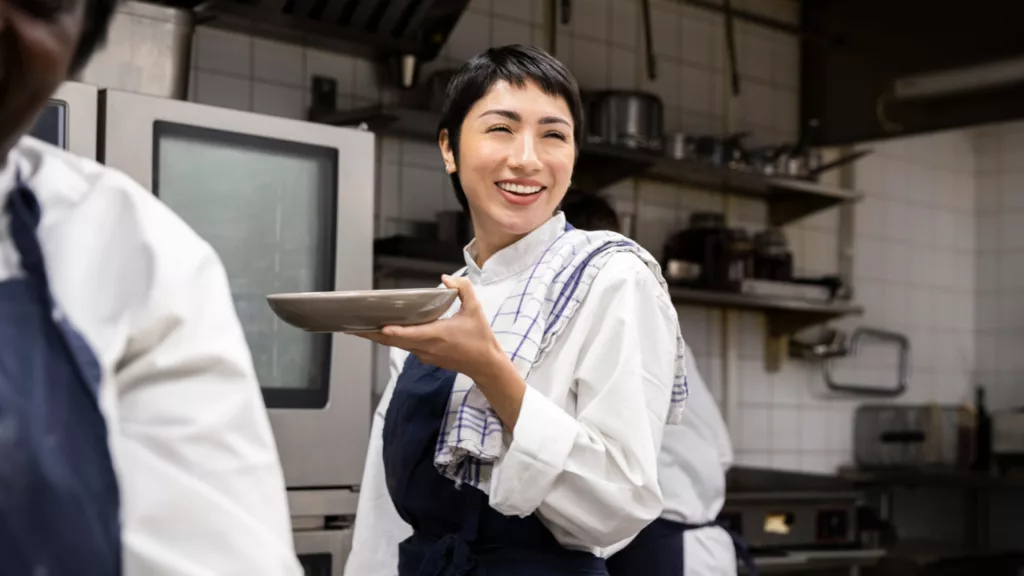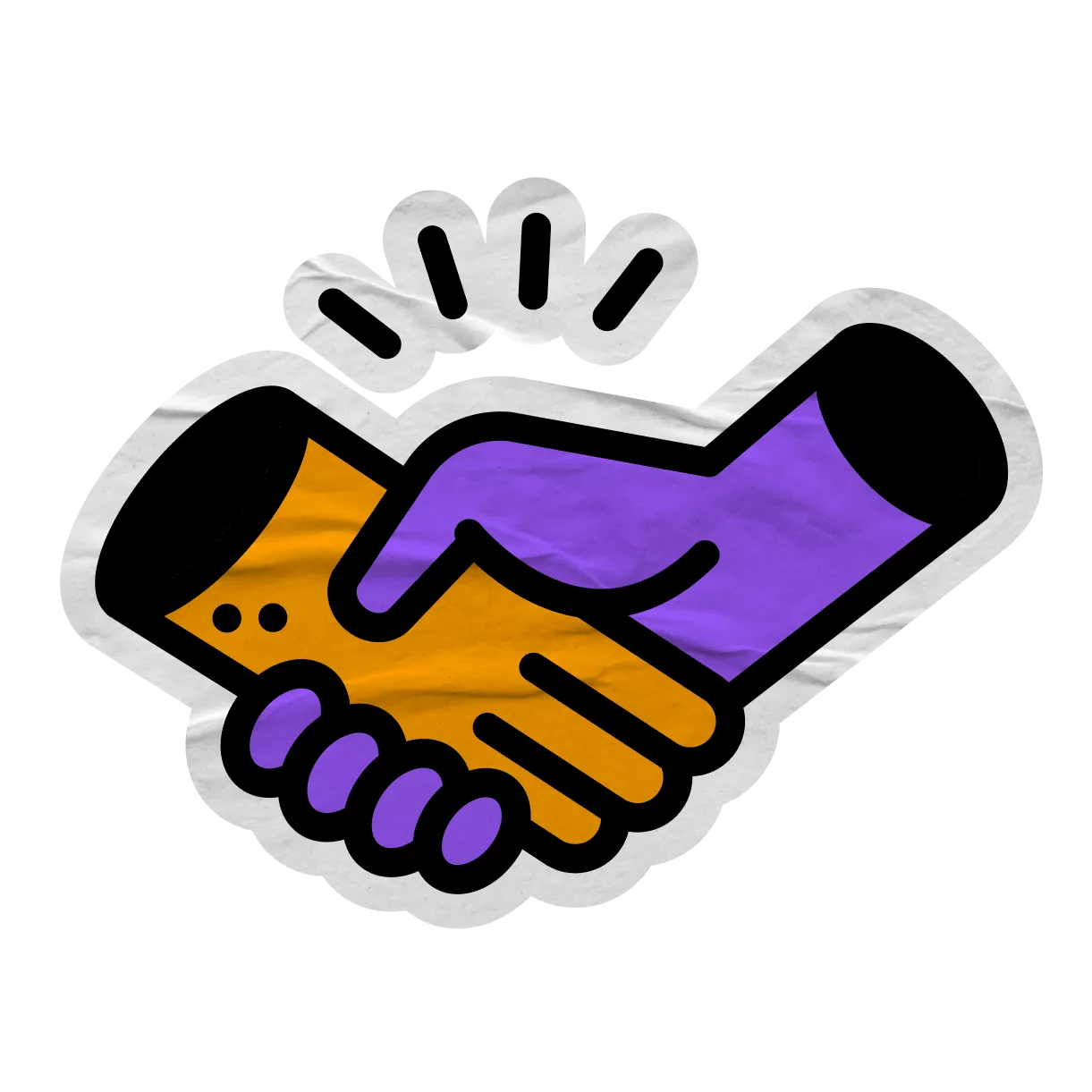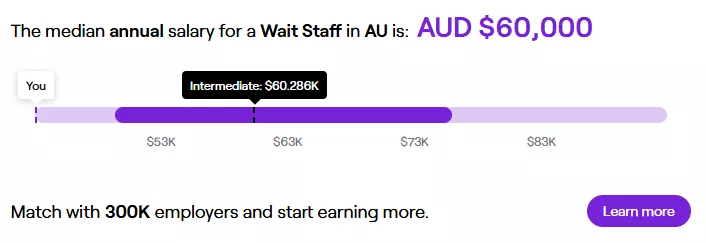Waiter Job Description: Duties, Skills, & Responsibilities
Access a personalised waiter and waitress job description detailing skills, salary expectations and key responsibilities.

Looking to hire waitstaff? Understanding the responsibilities of the role you’re hiring for is an important part of the recruitment process. When crafting a job description for a waitress or waiter, the listing should typically involve a variety of duties aimed at ensuring restaurant visitors have a pleasant dining experience. This includes greeting customers as they arrive, seating guests in the dining area, and ensuring guest satisfaction throughout their visit.
When finding your perfect candidate, you’ll want to ensure they can maintain a high standard across job duties such as taking food orders, drink orders, and delivering those orders to the kitchen and bar staff.
Waiters and waitresses will also need to provide menu recommendations, upsell specials, and assist with any dietary requirements or concerns that arise during the meal.
Waiter/waitress job duties and responsibilities
When it comes to the food service industry, one of the most important demands for wait staff is a high level of customer service. A waiter/waitress will be responsible for serving customers in a timely manner, and ensuring that food and beverages are delivered according to the order. They’re also expected to clear the dining room efficiently and maintain a clean, hygienic, and inviting atmosphere.
What should be included in a waiter/waitress job description?
A waiter/waitress job description should outline the job requirements the new hire will need to perform, including specific tasks such as seating guests, taking orders, serving food, and handling cash and credit card transactions. The description should also highlight the importance of excellent customer service, which is at the heart of the role.
A good job description will focus on both the technical skills required, such as the knowledge of food and beverage services, and the soft skills needed, such as customer service skills and the ability to remain calm under pressure. Which skills are the priority will depend on the individual role and your business, but ensuring your next hire has a varied skill set will make for a smoother onboarding. Hiring managers should also ensure that the description includes any minimum age requirements or other legal considerations that apply to the position.

Example of a job description
We are seeking a skilled and customer-oriented Waiter to join our team. The successful candidate will be responsible for providing excellent customer service, taking orders, serving food and beverages, and ensuring customer satisfaction. The ideal candidate should have a friendly and outgoing personality, excellent communication skills, and the ability to work in a fast-paced environment.
Responsibilities:
- Greet customers and take their orders
- Serve food and beverages to customers
- Ensure customer satisfaction by addressing any concerns or complaints
- Maintain a clean and organized dining area
- Handle cash and credit card transactions
- Collaborate with kitchen staff to ensure timely delivery of orders
- Upsell menu items and promote specials
- Follow all health and safety regulations
Qualifications:
- Proven work experience as a waitress or similar role
- Excellent communication and interpersonal skills
- Ability to work in a fast-paced environment
- Strong organisational and multitasking skills
- Ability to work well in a team
- Knowledge of food and beverage service
- High school diploma or equivalent

What is the best way to screen candidates?
When it comes to hiring, there are many ways to screen candidates. One method is to focus on both hard and soft skills to ensure a good fit for your team. This can come from reviewing resumes for relevant experience (particularly in the food service industry) to see if they’ve held similar positions before. It can also come in the form of assessing customer service skills through a structured interview, and asking the candidate how they would handle difficult situations.
You can also rely on hiring managers, or run practical assessments, such as role-playing scenarios or a trial shift. These can all give you a better sense of their skills and their ability to handle the demands of a busy dining area.
For a less manual approach, using platforms like Employment Hero can help find qualified candidates by matching them with your specific job requirements. With our SmartMatch tool to streamline the process of pre-screening candidates for you, you can ensure they have the right experience, food safety training, and are local to your area before jumping into interviews. This way, there’s no need for a lengthy job description, as the system already matches candidates based on their qualifications and experience.
Employment Hero gives you a talent pool with millions of active job seekers, ready and waiting to work. No job ads needed.
 |  |  |
| Instant matches, no waiting Skip the job ads. Every role gets a live shortlist of quality candidates, instantly matched from a network of over 1 million active job seekers. | Cut costs, hire smarter Reduce recruitment spend and time-to-hire by up to two weeks. With candidates built in, there’s no need for costly ads or long delays. | From sourcing to onboarding SmartMatch handles the entire hiring journey: sourcing, shortlisting, and onboarding—so you can focus on growing your team, not managing the process. |
What skills should a waiter and waitress have?
Waitstaff need a variety of customer service skills to be successful in their roles. Common skills that can aid a waiter/waitress include strong communication skills, a friendly demeanor, and the ability to multitask in an often fast-paced environment.
Excellent organisational skills are also essential for managing multiple tables and tasks at once, ensuring all food orders and drinks are served promptly. Having an understanding of dietary requirements can also make for a stronger candidate.

What qualifications should a waiter have?
A formal education is not usually required for waitstaff, but most employers prefer candidates who have completed food safety training. A high school diploma or equivalent is often listed as a basic requirement as well. Having prior experience in the food service industry can also be beneficial, although it’s not a strict necessity.
Job requirements may vary depending on your business, so employers will often look for qualities instead, such as excellent communication skills, an ability to work well within a team, and experience with serving customers.
What are waiter salary expectations?
Salaries for waiters can vary depending on location, establishment, and level of experience. Waiter salary benchmarking helps employers ensure their pay scale is competitive with the local market. By offering competitive compensation, restaurants can attract and retain qualified candidates, while giving their customers a great experience. If you’re looking to determine what you should be paying staff based on your industry, location and role, jump into our calculator below.

Should a waiter be required to have any specific education or training?
As mentioned previously, a formal education may not be mandatory for waitstaff positions, but many employers prefer candidates who have received food safety training or similar certifications. This ensures that waitstaff understand the importance of handling food safely and adhering to health regulations.
Some employers may also offer on-the-job training to develop customer service skills and teach employees how to operate point-of-sale systems. Understanding menu recommendations, dietary requirements and the specific cuisine offered at the venue is also a key part of the training process.
Should a waiter be required to have any specific experience?
Experience in the food service industry can be desirable, especially in busy establishments where speed and accuracy are crucial. Previous experience as a waitress or similar role can help candidates hit the ground running, allowing them to adapt quickly to the job duties. However, many employers are also willing to hire entry-level waitstaff and provide training for those without prior experience.
Frequently asked questions about waiters and waitresses
What daily duties and tasks will a waiter and waitress complete?
Waitstaff are expected to perform a wide variety of tasks on a daily basis. These include greeting and seating guests, taking food and drink orders, delivering food and drinks to tables, checking in with customers to ensure guest satisfaction, and handling payment transactions. They are also responsible for maintaining cleanliness in the dining room and assisting with other job duties as needed.
How can a business attract the best candidate for their open role?
To attract the best candidates, businesses should focus on employer branding by offering competitive wages, clear career progression opportunities, and a positive working environment. Additionally, platforms like SmartMatch can help attract qualified candidates by matching them with roles suited to their skills and experience. If you’re struggling to find talented waiters in your area, get in touch with our team and find your best match.
Is there a difference between a waiter and a food runner?
While the roles of a waiter and food runner often overlap, the main difference is in their job duties. A waiter takes food and drink orders from customers, serves food, and ensures guest satisfaction. A food runner, on the other hand, is primarily responsible for delivering food orders from the kitchen to the table, ensuring that each dish is correct and properly presented.
























